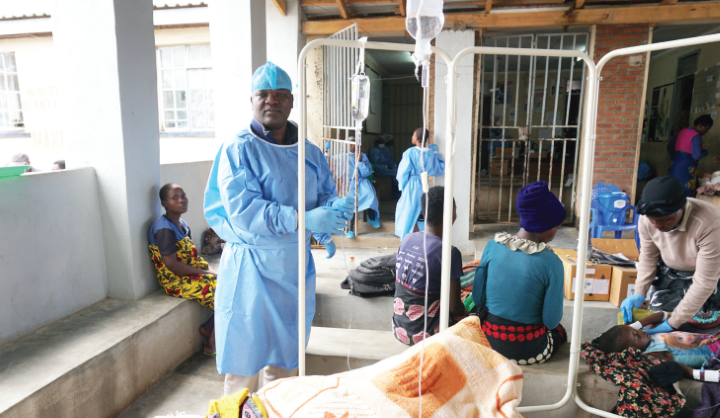Demystifying cancer
 Today is World Cancer Day, dedicated to dispelling damaging myths about the disease. However, the country will never run short of misconceptions and stigma until universal access to quality diagnostic and treatment services is guaranteed. James Chavula writes.
Today is World Cancer Day, dedicated to dispelling damaging myths about the disease. However, the country will never run short of misconceptions and stigma until universal access to quality diagnostic and treatment services is guaranteed. James Chavula writes.
When Malawians were commemorating the World Cancer Day last year, Geoffrey Zigoma was desperately groping for better hospitals in Tanzania and India because the local health care system could not treat the disease. Having been diagnosed with skin cancer in 2011, the one-time bestselling musician says his battle for treatment and care has offered him harsh encounters with the disease often surrounded by myths.
“Even people who are supposed to be in the know are lacking information not only on the causes and signs of cancer, but also when and where to seek treatment,” says Zigoma, who sought specialist treatment in India after about 18 months of chemotherapy at Queen Elizabeth Central Hospital (QECH).
He explains: “Unfortunately, our major hospitals take too long to detect the problem. The environment in which patients get treatment and care is hardly user-friendly. The wards are congested with people who end up dying of treatable conditions because they cannot afford to fly to South Africa, Tanzania or any other country which offer advanced treatment.”
In a country where his was just a symptom of widespread woes, Zigoma was only lucky to be sponsored by well-wishers, Air Malawi and music lovers to go for treatment abroad. Just when the artist had almost clichéd newspaper headlines with his appeal for funds and long wait for treatment, former Minister of Trade John Bande (now responsible for mining) told Malawians at the cancer commemorations that all referral hospitals will have a special wing for the disease. That has not happened. Even QECH, the largest referral, is still searching for ways to end the decried congestion ward.
As the unfulfilled promises await a new round of soothing speeches at the commemoration this week, Zigoma looks back to a world replete with myths that reinforce stigma and delays to go for screening. It is for this reason that the musician says he wished he had joined in the World Cancer Day to help dispel damaging misconceptions.
“There was a time when my people treated me as if cancer was incurable. People always looked at me with pity as if it was a death sentence. Others looked at me as if cancer is exclusively meant for albinos,” he lamented.
However, his case exposes the entire buzz about the ‘silent killer’ in a society where cancerous tumours are either viewed as any other swelling or manifestation of witchcraft. First, the country has a long way to guarantee its citizens reliable diagnostic and treatment options. Second, myths and stigma are rife despite the need for awareness, among the masses.
According to Union for International Cancer Control, this year’s World Cancer Day—themed ‘Cancer: Did You Know’—is a chance to “raise our collective voices in the name of improving general knowledge and dismissing misconceptions about the disease.”
Professor George Liomba, is one of the medical specialists to have toured the country to raise awareness about trends, symptoms and treatment of cancer. He says so deep-rooted are the misconceptions that some Malawians still believe that cancer is one incurable disease, yet it is a collection of over 200 conditions which share some similarities.
“We still have to do more to help people understand that because some cancers are curable, others are not. Some are meant for children, others are not,” says the pathologist, who retired from the College of Medicine.
Oncologist Leo Masamba said reducing cancer to one menace is one of the major longstanding misconceptions that lead to condemnation of the patients.
“There are a lot of myths but they are yet to be quantified by medical research. However, where people believe that cancer is incurable, they are likely to condemn the patients. Relatives are likely to feel that the patient is already gone; doctors will start thinking that they have nothing more to offer and the patient will feel desperate,” said Dr Masamba.
On its website, the World Health Organisation (WHO) says cancer accounted for about 7.6 million deaths in 2008. This denotes 13 percent of global mortality—a toll higher than malaria, tuberculosis and HIV and Aids combined.
However, cancer is not a death sentence. Some can be cured if identified early. While local hospitals have registered milestones in screening cancer, the perspectives of the diseases incurability are compounded by lack of modern technologies for healing it.
Local hospitals only offer chemotherapy—a drug-based treatment for specific cancers—and Ministry of Health spokesperson Henry Chimbali told the press that government has designated Kamuzu Central Hospital in Lilongwe for a purpose-built cancer centre with hi-tech radiography equipment.
While the project is yet to materialise, patients are overcrowding in provisional spaces such as Ward B at QECH where Masamba and about three nurses cater for 50 to 70 patients. Overcrowding affects cancer treatment, says Cancer Association of Malawi chairperson Chifundo Chogawana.
“The temporary space is overrun by life-threatening congestion. There are no isolation rooms, a requirement for patients with low immunity due to cancer and chemotherapy. A better ward is an answer to better care,” Chogawana told The Nation last May.
Lawyer-cum-musician Davis Njobvu is spokesperson of a group of various professionals who have been raising funds for the construction of a special wing for cancer patients at QECH. While government is grappling to establish a central facility, he says it is the duty of every Malawian— celebrities, clerics, journalists and politicians—to ensure information and treatment options are available even to the poorest of the poor.
And Zigoma feels the myths will remain until government and its partners start providing the treatment Malawians deserve.





